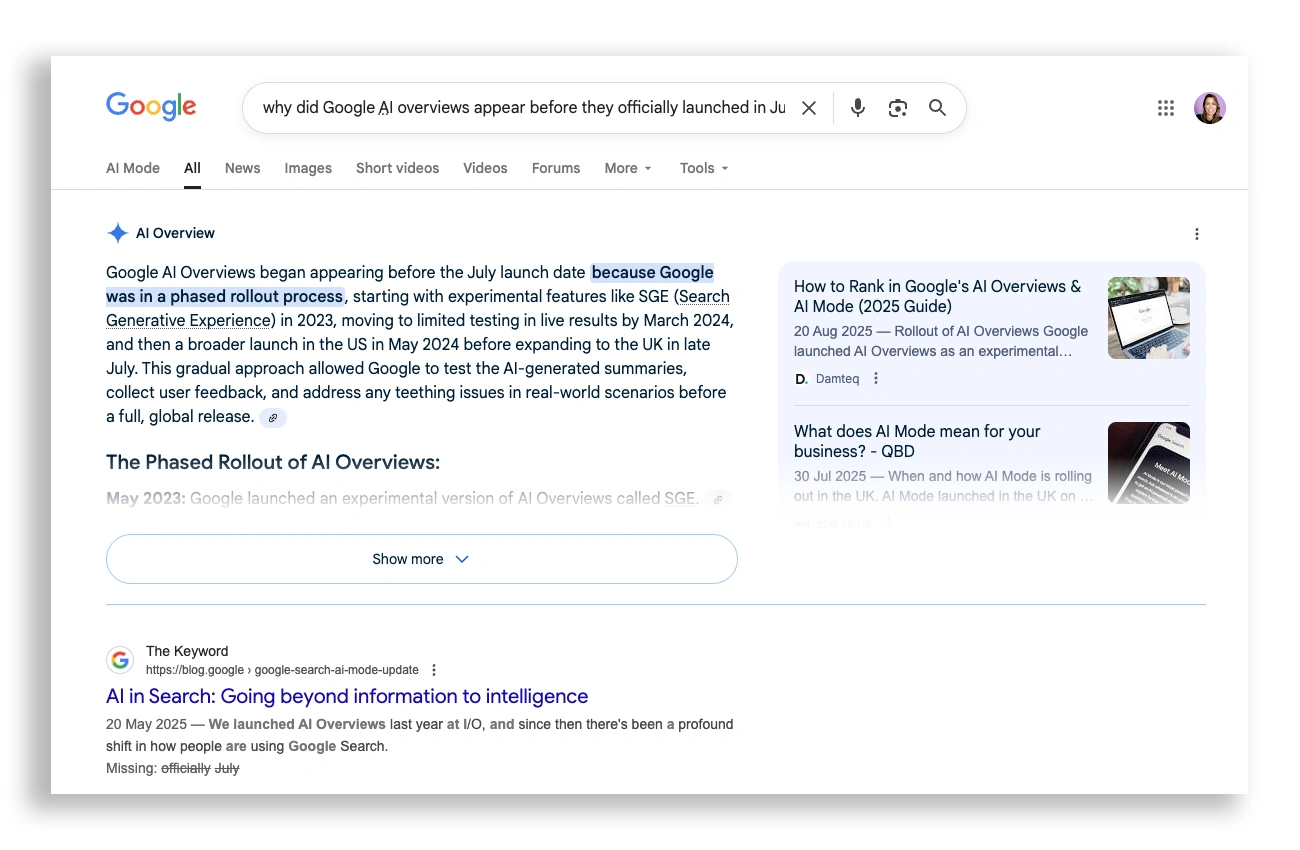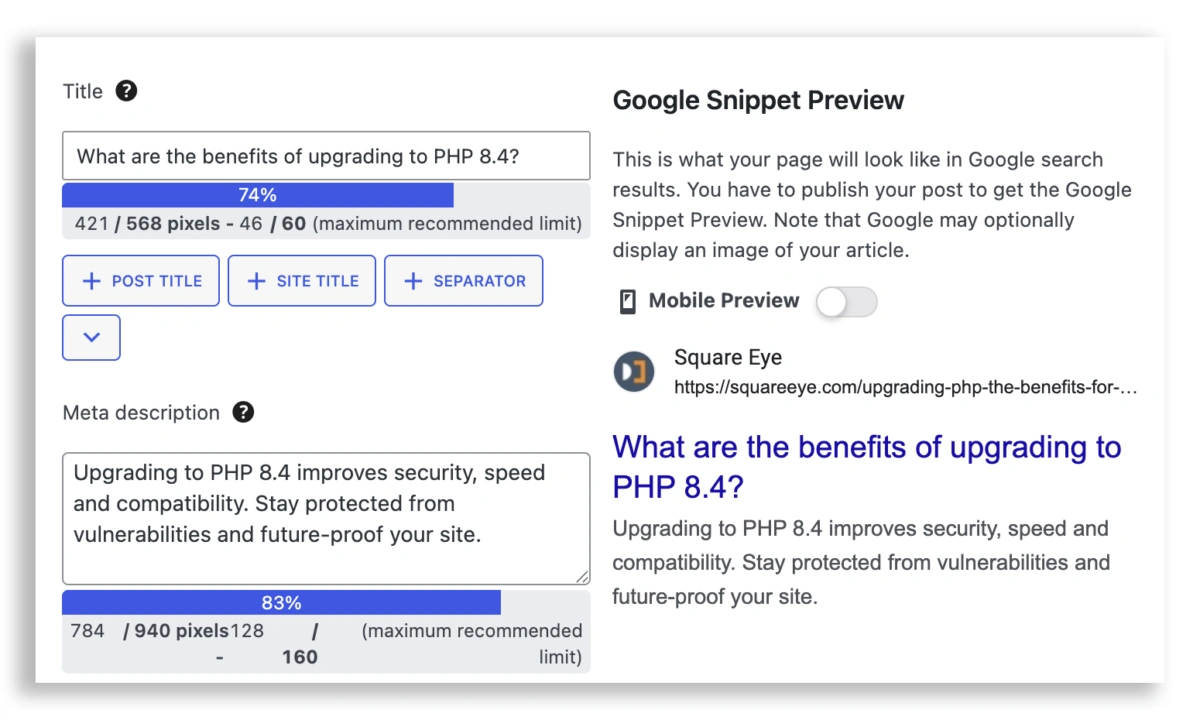AI Overviews (previously called the Search Generative Experience) are summaries generated by Google’s artificial intelligence and shown at the very top of the search results page. They aim to answer users’ questions directly, drawing on content from across the web.
Google officially launched AI Overviews and AI Mode in the UK over the summer. This may come as a surprise, as AI-generated content has already been appearing in search results for some time. But now that the rollout is official, it’s time to prepare: doing so will improve not only visibility within AI Overviews but also overall search performance and usability.
For barristers’ chambers and law firms, the implications are clear. AI-generated results may reduce the visibility of traditional search listings, even for sites that currently rank well. And because legal content is often complex, it is crucial that the right sources – qualified professionals – are the ones surfaced and cited by search engines.
What are AI Overviews?
When a user types a question into Google, especially one that starts with “how”, “can I”, “what is”, Google’s AI Overviews will generate a short, AI-written answer at the top of the page. These summaries pull from multiple websites and are designed to give a fast, accurate response without requiring a click.
For example, someone might search “how do I challenge a planning decision in the UK?” Rather than linking directly to a firm or chambers, Google could display a paragraph summarising the process, followed by links to sites it used to create that answer.
For law firms and chambers, the question becomes: how can your content be included in these summaries, rather than pushed down the page?

How can chambers and law firms prepare?
Getting ready for AI Overviews doesn’t require a wholesale change in strategy. It’s about refining and structuring your content so it’s easier for Google’s AI (and users) to understand and trust.
Here’s a checklist to help your chambers or firm prepare.
1. Structure content so it answers clear questions
AI Overviews look for straightforward, well-structured content that answers specific questions. Make sure you do the following to help it find your information:
- Use headings that mirror how people search (for example, “What is judicial review?”).
- Include short, direct answers immediately below each heading.
- Break down complex ideas using bullet points or numbered steps.
- Place summaries at the top of pages: answer first, details later.
- Keep paragraphs short and accessible.
2. Target informational search terms
AI-generated results are most likely to appear for educational or procedural queries. You need to:
- Identify the questions clients, journalists, or other lawyers might search for.
- Map those questions to content already on your site or create new pages or FAQs.
- Use Search Console to spot queries that have high impressions but low clicks.
3. Use schema markup to help Google interpret your pages
Schema is behind-the-scenes code that tells search engines what type of content is on your site. We can use schema mark-up to help signpost your content by:
- Adding FAQ schema to question-based content.
- Use Article schema for blog posts and news items, and service schema for service or practice area pages.
- Add Person schema to barrister or solicitor profiles, including practice areas and qualifications.
- Implement Breadcrumb schema to clarify site structure.
See also: Schema markup: how to get richer Google listings for your law firm or chambers
4. Show who wrote the content – and why they’re credible
Google’s AI systems prefer to reference content from recognised, authoritative sources. So make sure you:
- Include bylines on articles and updates, with a short professional title (for example, “By Anna Clarke, barrister – immigration and public law team”).
- Keep team profiles detailed and up-to-date, especially for contributors.
- Reference authoritative sources like legislation, government guidance or key cases.
- Maintain complete About and Contact pages with clear professional context.
5. Optimise for featured snippets and quick answers
Much of the content shown in AI Overviews is drawn from the same pool as featured snippets, the short text boxes you sometimes see above search results. To optimise for this:
- Rework your most visited pages to answer one straightforward question at the top.
- Write in plain English whenever possible; prioritise clarity over complexity.
- Use meta titles and descriptions (page titles and descriptions for SEO) that match what users are searching for.

6. Maintain good technical health
A clean, fast-loading site supports both SEO and AI visibility.
- Ensure mobile-friendliness / responsiveness across all pages.
- Improve loading speeds and fix technical errors.
- Use clear, readable URLs (for example, /immigration/judicial-review).
- Keep your sitemap current and submit it regularly to Google.
- Ensure llm.txt is set up properly to signpost your keeness to entertain AI search engines/large language models (LLMs).
See also: Optimising your chambers website and barrister profiles for ChatGPT & other LLMs
7. Improve visibility beyond your own website
AI-generated results often favour sites that are well-cited and linked across the web.
- Keep your chambers or firm profiles updated on LinkedIn, Google and legal directories.
- Contribute to legal publications, conferences or external blogs where possible.
- Earn backlinks through case commentaries, interviews or event speaking.
- Maintain consistency in how your organisation is named and described online.
8. Monitor and adapt over time
AIO and GEO tracking tools can help track how you appear. Existing analytics tools and performance data can also help you plan in the following ways:
- Watch for content with high impressions but falling click-through rates
- Use incognito searches to check how Google responds to your key queries
- Keep an eye on updates from Google, SEO analysts and legal marketing publications.
Looking ahead
There is much conjecture about the future of search. Preparing your content now helps safeguard your chambers or firm’s online visibility, supports better search performance and strengthens how your expertise is presented to both users and search engines.
This isn’t just about AI. It’s about ensuring that the right legal professionals are the ones being cited, referenced, and trusted, whether by a human or an algorithm.
We’re already working with chambers and firms to help them stay ahead of these changes. If you’d like support reviewing your website’s structure or optimising for AI-ready content, please email us at [email protected].





